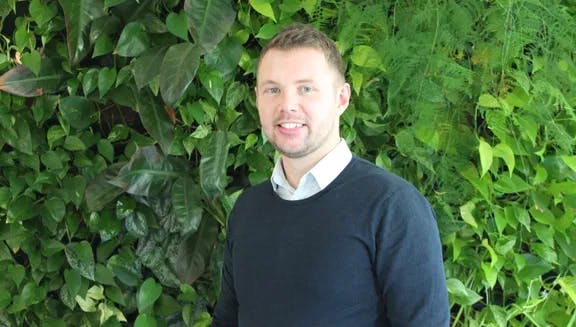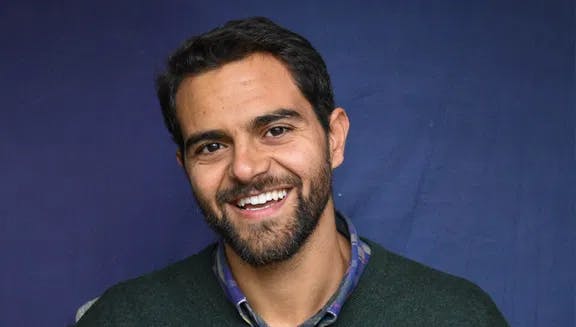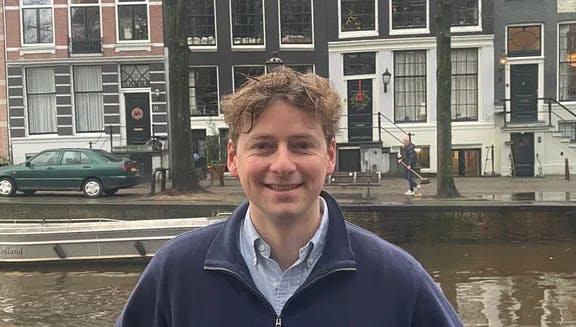#FoundersFridays: Meet Wouter Vertogen

#FoundersFridays is a StartupAmsterdam interview series: for entrepreneurs, by entrepreneurs. Each hero answers questions on their entrepreneurial journey, their learnings, milestones and bottlenecks, as well as on Amsterdam and the Dutch startup scene. It’s a platform for entrepreneurs to speak their minds freely and pass on their learnings to anyone who’s thinking about founding a startup as well.
This month, we spoke to Wouter Vertogen, founder of Lanced - a SaaS-enabled marketplace with an integrated production management platform where both companies and artists can connect, collaborate, and create.
What is Lanced and what made you start it? What problem did you want to solve?
Until 2 years ago, I was chasing a career as a professional dancer. After graduating from the dance academy, I danced for contemporary dance companies, cruise ships, stadium shows, and operas around the world. Lanced originated from the struggles and inefficiencies I experienced and witnessed throughout that career.
When it comes to the management and administration aspects of the creative processes, such as organising auditions or creating a fitting rehearsal schedule, there is a severe lack of tech solutions that truly support companies in creating these shows. Most companies in the creative industries are on tight budgets and often have too few people working on too many things at once. It’s ineffective, inefficient, and mostly leads to very stressful situations.
On the other hand, I also know how hard it is to enter the work field as an artist. Artists tend to struggle with managing their careers, finding work, and networking. Especially when they go freelance… I was 100% one of them! So what really drove me to create Lanced was the urge to give the next generation of artists a fairer shot at creating a career out of their passion. It just felt like the entire industry was due for a big technological upgrade.
What we set out to do with Lanced is to create a platform that offers solutions to both companies and artists, and help them get connected. On Lanced, artists should be able to manage their careers, while companies should be able to build and manage their teams for their productions.
As someone who’s digitising the creative & cultural sectors, what is your prediction for it?
I believe that we are nearing a tech-induced Cultural Renaissance. I know this sounds a bit intense but it is nothing new when you look at our history. Art & Science have always been the drivers of innovation and economic growth. However, the Art & Culture sectors lag significantly in their adoption of new technologies capable of propelling them to unprecedented heights. On the flip side, the majority of people working on tech replacing the work of artists are completely out of touch with what it means to create actual art.
When it comes to the latest developments, I don’t believe that AI will replace creativity because human emotions form the core of creativity. Creativity is often more about the process than the result. For example, no dancer is going to ask AI to create their choreography because that defeats the purpose of dance entirely; which is self-expression through the use of the body.
What I do believe, as I wrote in this op-ed on AI vs Creativity, is that AI is going to be able to tremendously speed up the creative process and can serve as a great tool to empower creativity and simultaneously make it more accessible. This is essentially what we are working on at Lanced. We’re critically looking at what processes could be automated and where AI could add real value without replacing the work of the artists.
Breakthrough technologies such as Web3, XR, and AI are creating some awesome new art movements but they won’t replace the original ways of creating art, just like how photography didn’t replace the art of painting. What I find most exciting about these novel technologies is the potential for crossover opportunities where artists are able to tap into new revenue models and reach new audiences.
What makes Amsterdam a great city and a great ecosystem for a startup founder?
First of all, Amsterdam has always been a place where I can fully be myself and express myself. The LGBTQIA+ community is incredible and I am very excited about this year’s new Queer & Pride Amsterdam. Coming from a creative background, I know Amsterdam as a city filled with opportunities for artists and creatives. That’s why the Art & Culture sectors are so diverse and international.
Entering the startup ecosystem of Amsterdam was a bit of a journey for me since I don’t come from a tech or business background. To be honest, I’d say that I am still entering the scene. However, from what I have experienced so far - there are a lot of great initiatives and platforms, such as Leapfunder, that support founders on their journeys. Actually, it was StartupAmsterdam that helped me discover most of the events I joined!
I literally just showed up to all these events alone not knowing anyone but somehow always left with some really great connections. I find that the tech ecosystem is actually very open and welcoming in that sense. That said, because I come from such a creative and diverse background, I will be a bit critical in saying that I would love to see more diversity amongst founders. It was quite shocking to learn how few female founders there are out there.
To me, diversity goes a lot further than the gender equation. I’d love to see more representation of founders from different cultural backgrounds and the LGBTQIA+ community. I believe that diversity is key to the success of a startup and that Amsterdam is a great city for nurturing that diversity.
Where is Lanced now: what are the biggest wins, the bottlenecks and needs for the upcoming 6 months?

My co-founder Stavya Bhatia and I recently finished the CultTech Accelerator in Vienna and pitched Lanced during their Demo Day as part of ViennaUp ‘23. The accelerator is focused on tech startups at the intersection of Culture & Tech… which made a lot of sense for Lanced! It was an incredibly valuable experience and resulted in many industry connections.
Regarding our platform, in June we announced a brand-new partnership with a large international dance organisation and released a major platform update for artists. We’re nearing 2700 performing artists on our platform, so that is pretty exciting! In the coming 6 months, we are focused on upgrading the company tools and will launch our subscription model in October. Personally, I am more excited about the work on our AI-matching tool, because that’s a sector first. Well, at least in the Arts & Culture space.
I think running out of funds is always going to be an issue for any startup in the early stage, especially when you are self-funded. Recently, we have actively started raising our Pre-Seed round but it’s a little too early to make any statements on that at this moment. All I can say is that I am very positive that we will be able to close our round in the second half of this year.
What do you think is the most important quality a founder should have?
I think it’s important to have perseverance. It’s a lesson I learned during my career as a professional dancer. You’re going to get a lot of no’s, and a lot of people will tell you that you are crazy for chasing a career in dance, so without perseverance you are simply not going to make it… mentally and physically.

The same applies to founders, especially to founders who see something that others don’t yet see. It’s going to require a lot of perseverance for you to turn that vision into reality. But it’s exactly that vision, passion, and mission that will fuel your perseverance and get you across the finish line.
For someone who’s made a big change in their career (a 180, if you will) - what is your biggest learning and advice for people who are thinking of doing the same?
First of all, I believe that you should be doing what you love. I have always followed my dreams and passions in life even though it required taking some big risks. I think that it’s also the first piece of advice I would give: follow your passion and be prepared to take risks. It’s exactly what people say; the bigger the risk, the bigger the reward.
Looking back at my career change, it wasn’t something that I decided on overnight or planned for. It was a 3-year long process because I wasn’t ready to give up on dance just yet. Truth be told, it was the Covid pandemic that practically forced me to sit at home and re-evaluate my career. That time at home gave me a lot of space to think and create. Lanced was actually more of a stay-at-home Covid project and wasn’t even named Lanced.
I would have never imagined going down the tech entrepreneur route but somewhere along the way, I got so passionate about Lanced that I just had to continue. I am very passionate about helping others succeed and that is exactly the mission of Lanced. It was only when I found that true passion for Lanced that I was ready to let go of dance. I realise how lucky I am because not many people get to turn their passions into their careers… somehow I managed to turn two passions into my careers.
What really helped me during my career switch is my drive and willingness to learn and keep developing myself. I have this forever-learning mentality because I get a lot of joy from learning new things. I think that having the ambition to keep learning will help you tremendously if you decide to make a 180 like I did.
Whether you are considering switching careers because you want to follow your passion or take the leap into entrepreneurship, I encourage you to just go for it! Life is too short to be boring anyways. “I would rather die of passion than of boredom” – Vincent van Gogh said it first.
If you’re an Amsterdam-based founder working on an innovative solution that solves an urban or social challenge, and you’d like to share your story with our audience, email Alexandra at a.belicova@amsterdam.nl.
Related articles

#FoundersFridays: Meet Bibi Schmidt

#FoundersFridays: Meet Layla Li

#FoundersFridays: Meet Zsofia Kollar

#FoundersFridays: Meet Nikolay Tsanev

#FoundersFridays: Meet Gabriel Poltorak

#FoundersFridays: Meet Peter-Paul de Leeuw

#FoundersFridays: Meet Ahmed Mamdouh Khalil

#FoundersFridays: Meet Joris Oudejans

#FoundersFridays: Meet Michael Musandu
